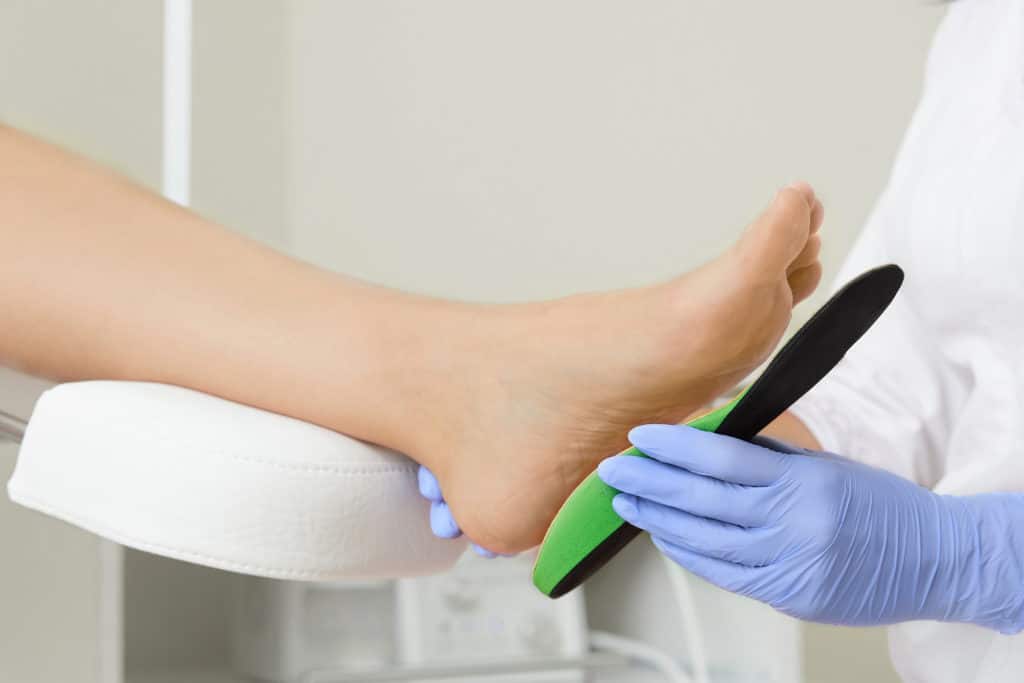Does Medicare Cover Orthotics?
Medicare is a great resource for eligible beneficiaries to help pay for medical expenses. Orthopedic care can come with a hefty cost, and you may want to know, “Does Medicare cover orthotics”?
Yes, but only if your condition meets certain requirements and plan qualifications.
You can quickly and confidentially shop plans here.
When you have foot problems, it may seem like every little movement you make causes excruciating pain. Even standing still can be difficult. Orthotics can provide relief for people experiencing orthopedic problems such as osteoarthritis, foot pain, or back pain.
Does Medicare Cover Orthotic Shoes or Inserts?

Orthotic shoes are custom-fitted footwear designed to reduce the patient’s pain for a variety of health conditions including:
Metatarsalgia: chronic pain in the ball of the foot
Plantar fasciitis: chronic breakdown of soft tissue around the heel
Bunions: a painful, bony bump on the outside of the big toe
For the most part, Medicare does not cover orthopedic or inserts or shoes, however, Medicare will make exceptions for certain diabetic patients because of the poor circulation or neuropathy that goes with diabetes.
Medicare may cover the fit and cost of one pair of custom-fitted orthopedic shoes and inserts once per year for those patients.
How Much Does Medicare Pay for Orthotic Services?
Podiatrists are doctors who specialize in the feet and ankles, and they prescribe and design medically orthotic devices. Orthopedic devices as part of a leg brace fall under Medicare’s guidelines for durable medical equipment (DME).
In order for Medicare to cover orthotics, your doctor must first determine that orthopedic care is medically necessary. Medicare Part B may cover about 80 percent of the Medicare-approved cost, and you may have to pay the remaining co-insurance. The company that supplies your DME must be Medicare-approved.

Does Medicare Cover Orthotics for Plantar Fasciitis?
Plantar fasciitis, also called “Policeman’s Heel,” is an often self-treatable and diagnosable ailment involving inflamed tissue on the bottom of the foot. You may feel stabbing pain near your heel. It can usually be treated with physical therapy, shoe inserts, steroid injections, and surgery in some cases.
Podiatrists often prescribe treatment for plantar fasciitis. If your doctor is able to prove that it is medically necessary and the prescription is required, you may be able to get coverage at the Medicare-approved amount. Additionally, there may be some Medicare Advantage plans in your area that provide coverage for orthotics for plantar fasciitis.

Does Medicare Cover Orthotics for Weight Loss?
According to the Hospital for Special Surgery (HSS), orthotics can help ease the extra stress on the feet for overweight people. Medicare does not cover orthotics for people who are overweight just because they are overweight.
Medicare may cover weight loss services such as surgery and/or nutrition counseling for people who qualify. Some Medicare Advantage plans even cover fitness programs!
You may also be able to get over-the-counter benefits with some Medicare Advantage plans. So, even though you may not qualify for prescription orthotic coverage, you may be able to find coverage for over-the-counter products you can find at your local drugstore or mail-order pharmacy.
Does Medicare Cover Orthotics After Hip Replacement Surgery
Sometimes doctors prescribe hip braces as a part of hip replacement surgery recovery. However, hip braces oftentimes don’t include a foot orthotic device. Medicare may help pay for the hip brace as part of your DME coverage, but coverage may not include an orthotic device.
According to Dr. James P. Ioli, DPM, a podiatrist with the Harvard Medical School, you should have a physical therapist assess your “pelvic, hip, knee, ankle, and foot movement” to examine how your “soft tissue restrictions [muscle and cartilage stiffness]” and flexibility contributes to your pain. The physical therapist can address your pain and make recommendations to manage it.
Does Medicare Cover Transportation for Orthotics Appointments?
Medicare may cover non-emergency medical transportation in an ambulance if you have a doctor’s note detailing why an ambulance is medically necessary.
If you don’t need an ambulance, some Medicare Advantage plans cover non-emergency medical transportation to doctor’s appointments, to the hospital, and to the pharmacy. Contact your agent to learn more about Medicare Advantage supplemental benefits.

Does Medicare Cover Podiatry?

While Medicare will only cover orthotics if they’re part of a leg brace or for diabetes, Medicare will cover treatment for the following conditions:
Morton’s Neuroma
Morton’s Neuroma is irritation of nerves in the toe. One common sign of Morton’s Neuroma is numbness, and podiatric treatment for Morton’s neuroma includes using a metatarsal pad, cortisone injections and surgery in some extreme cases.
Plantar Fasciitis
Plantar Fasciitis is when the plantar fascia tears. The breakdown causes severe pain with standing and walking. Patients usually experience the most pain first thing in the morning because the calf and foot muscles tighten up overnight.
Plantar Fasciitis treatment includes physical therapy for proper stretching exercises, wearing a splint at night and cortisone injections. If pain becomes severe, a podiatrist might recommend surgery.
Bunions
The pain and stiffness associated with bunions usually worsen gradually. Podiatrists normally start small with treatment and prescribe bunion pads, toe spacers or shoe inserts. If those items fail, the podiatrist may recommend surgery.
Stress Fractures
Stress fractures occur after repeated blows to an area cause tiny fractures. Common causes of stress fractures include walking, running, frequent jumping and playing sports.
Most stress fractures will heal on their own after the patient walks with crutches or uses a walking boot. In some severe cases, the fracture won’t heal because it’s in a complex foot bone, and surgery will be the only course of action to correct it.
Peripheral Neuropathy
Peripheral Neuropathy is caused by nerve damage. The damaged nerves are unable to send the proper messages from the central nervous system to the rest of the body.
Peripheral Neuropathy causes the patient to experience pain, burning sensations, numbness, tingling, and weakness. Common Peripheral Neuropathy causes include:
- Diabetes
- Neurological disorders such as Spina Bifida
- Foot injuries
- Exposure to toxins
- Infection
- Autoimmune conditions
- Vitamin deficiencies
- Chronic alcoholism
Peripheral Neuropathy has no cure, and treatment only relieves the patient’s symptoms. The most common treatment for neuropathic pain is prescription drugs, but also topical creams, gels, and patches. In some cases, a cortisone sympathetic nerve block can provide temporary pain relief.
Medicare will only cover your treatment if your podiatrist says it’s medically necessary. Medicare Part B may cover 80% of the Medicare-approved costs. You will be responsible for the Medicare Part B deductible in order for Medicare to cover podiatry.
Podiatric Care Not Covered by Medicare
Medicare does not cover routine podiatry services, because CMS doesn’t consider them to be medically necessary. Some of those treatments and services include:
- Trimming toenails
- Foot cleaning and soaking
- Removing corns and calluses
- Treatment for flat feet
Get Medicare Coverage for Orthotics and Podiatry Today
Medicare will only pay for limited podiatric services, and having the right coverage can make all the difference in your quality of care. The licensed agents at Medicare Plan Finder are highly trained and ready to help you find a plan to suit your budget and lifestyle.
Call us at (833)-567-3163 or contact us here today.

This post was originally published on May 28, 2019, and updated on December 11, 2019.

